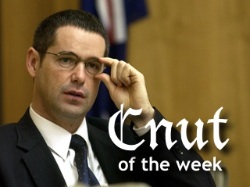
[This article was first published in Crikey on Monday. I’ve also added the comment and additional material which were published yesterday.]
Hurrah! The War on Terror is over! Well, at least it seems we’re no longer afraid of terrorists, because when Home Affairs Minister Bob Debus warned that illegally copying DVDs costs the industry $1.7 billion, for a change terrorism didn’t get a mention.
Major distributors have been trying to scare us off illegal copying for years. Australia’s laws were “harmonised” under the US Free Trade Agreement so copyright infringement became a crime. Gloomy doom-music-laden messages play before every movie. Serious people tell us that “piracy funds terrorism”.
“The Abu Sayyaf — blamed for the worst terrorist attacks in the South-East Asian country — are likely behind the illegal copying of movies onto DVDs,” reckons Edu Manzano, chairman of the Philippines’ Optical Media Board.
“The Yakuza are behind them in Japan and the Hezbollah are involved in the Middle East,” though he admits they lack “documentary evidence”.
Bob Debus’ weekend media release omits the “piracy funds terrorism” trope, saying instead that it funds “a range of criminal activity like drug trafficking and money laundering”. (Hang on, isn’t money laundering self-funding?) But by the time the story hit the ABC the government’s current bogeyman had been added to the list: child pornography. Ooh err.
Continue reading “Crikey: The inflated cost of illegally copied DVDs”


 Maybe I’m jumping the gun here, because the actual recommendations aren’t online yet. But news today that
Maybe I’m jumping the gun here, because the actual recommendations aren’t online yet. But news today that